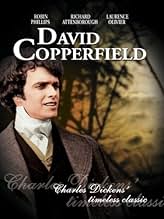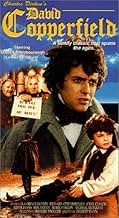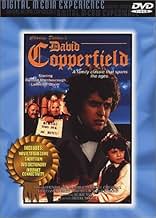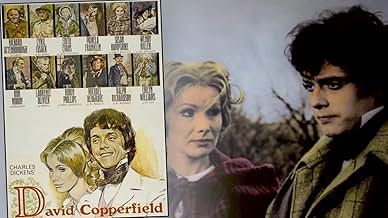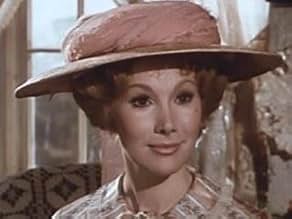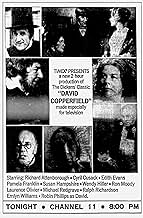The legendary novel by Charles Dickens comes to life in this colorful interpretation directed by Delbert Mann.The legendary novel by Charles Dickens comes to life in this colorful interpretation directed by Delbert Mann.The legendary novel by Charles Dickens comes to life in this colorful interpretation directed by Delbert Mann.
- Director
- Writers
- Stars
- Nominated for 3 Primetime Emmys
- 4 nominations total
- Director
- Writers
- All cast & crew
- Production, box office & more at IMDbPro
Featured reviews
This was never one of my favourite Dickens stories - I always found the title character just a bit , well, wet! Anyway, the really quite mediocre Robin Phillips take the role for this adaptation, and we follow his rather brutal adventures of childhood and early adulthood that see him deal with bullying, beating, extortion and tragedy. As with the book, to which this is fairly faithful, there are quite literally heaps of curious and engaging characters he encounters along the way, most notably Sir Ralph Richardson's wonderfully over the top "Micawber", Sir Michael Redgrave's "Peggotty" desperately seeking his errant daughter "Emily" (Sinéad Cusack) and from Ron Roody as the duplicitous, downright nasty piece of work that is "Uriah Heap"! The production is pretty lacklustre. The photography offers us lots of long, moody shots of the contemplative hero on the beach - and the cameraman seems content to try out his new zoom lens just once (or thrice) too often. Malcolm Arnold provides us with an unremarkable score and the whole story irather plods along without much potency. As an introduction to the work of Dickens, it might have a purpose in diverting the viewer to the author's (and his other, better) novels, but a piece of cinema it's little better than a very well cast television movie.
According to IMDb, there have to date been 388 film and television adaptations of books by Charles Dickens, but the treatment of his works has been very uneven. A remarkably high proportion of those adaptations are based (sometimes very loosely) upon his novella "A Christmas Carol", which seems to inspire at least one film every festive season, and many of the others are derived from either "Oliver Twist" or "Great Expectations". Although "David Copperfield" is one of Dickens's best-known novels, it has proved less popular, at least in the cinema. (There have been a number of TV adaptations). To the best of my knowledge the 1935 version with Freddie Bartholomew and W.C. Fields, which I have never seen, remains the only feature-film version since the coming of sound. This version from 1970 is of feature-film length but was made for television.
"David Copperfield" is often described as an "autobiographical novel", and some of David's experiences, such as his time in the bottling factory and the fact that he eventually becomes a writer, do indeed reflect the author's own. Indeed, it is said that Dickens deliberately gave his hero his own initials, albeit reversed. In one important respect, however, it is not autobiographical. Dickens was 39 when his father died, and his mother only predeceased him by seven years. David's father, however, dies before he is even born, and his mother dies while he is still a boy. It is notable that a number of Dickens's other heroes, such as Oliver Twist and Pip in "Great Expectations" are also orphans. I wonder what psycho-analysts would make of this fact.
The plot is a complex one, and I will not try to summarise it in this review. The film-makers try and keep most of the main features of the novel, but even so there are some odd gaps. One minute, for example, David is a child, a penniless vagabond who has just run away from the bottling factory in search of his aunt (his last surviving relative), the next he is not only an adult but also, it would seem, a young man of some means and social standing, and it is never explained how this transformation has taken place. Although Mr Micawber (a character said to be based upon Dickens's father) appears, the episode in which he is imprisoned for debt is cut from the film, so he never comes across as the improvident spendthrift described by Dickens.
The cast includes some of the leading British actors of the period, such as Laurence Olivier, Richard Attenborough and Edith Evans, mostly in cameo roles. Michael Redgrave has a more substantial role as Daniel Peggotty, as does Ralph Richardson as Micawber. Some on this board have described Robin Phillips (an actor I have not come across in any other films) as "dull", but I thought he made David a very personable young man. There are good performances from Pamela Franklin as the beautiful but empty-headed Dora and from Redgrave's son Corin as Steerforth, but Ron Moody never makes the same impression as Uriah Heep as he had done playing another Dickensian villain, Fagin in "Oliver!" which had appeared a couple of years previously. Susan Hampshire's Agnes is rather colourless, but the fault here probably lies with the author rather than the actress. Dickens's virtuous young heroines are never his most convincing creations.
Dickens' story is a good one, which can stand a certain amount of rough treatment at the hands of film-makers, which is why I have given this version an above-average mark. It does, however, confirm my view that Dickens is not the most cinematic of authors. There is a reason why so few feature films have been based upon this and some of Dickens's other novels. They are so long and so packed with incidents and characters that there is just not room to do them justice in the traditional two-hour (or two-and-a-half-hour) slot. "Oliver Twist" and "Great Expectations" are, relatively speaking, shorter and simpler, which is why they tend to be exceptions to the rule. His longer novels tend to work better as television mini-series, and a number of very good Dickens adaptations have been made in this format, particularly by the BBC. 6/10
"David Copperfield" is often described as an "autobiographical novel", and some of David's experiences, such as his time in the bottling factory and the fact that he eventually becomes a writer, do indeed reflect the author's own. Indeed, it is said that Dickens deliberately gave his hero his own initials, albeit reversed. In one important respect, however, it is not autobiographical. Dickens was 39 when his father died, and his mother only predeceased him by seven years. David's father, however, dies before he is even born, and his mother dies while he is still a boy. It is notable that a number of Dickens's other heroes, such as Oliver Twist and Pip in "Great Expectations" are also orphans. I wonder what psycho-analysts would make of this fact.
The plot is a complex one, and I will not try to summarise it in this review. The film-makers try and keep most of the main features of the novel, but even so there are some odd gaps. One minute, for example, David is a child, a penniless vagabond who has just run away from the bottling factory in search of his aunt (his last surviving relative), the next he is not only an adult but also, it would seem, a young man of some means and social standing, and it is never explained how this transformation has taken place. Although Mr Micawber (a character said to be based upon Dickens's father) appears, the episode in which he is imprisoned for debt is cut from the film, so he never comes across as the improvident spendthrift described by Dickens.
The cast includes some of the leading British actors of the period, such as Laurence Olivier, Richard Attenborough and Edith Evans, mostly in cameo roles. Michael Redgrave has a more substantial role as Daniel Peggotty, as does Ralph Richardson as Micawber. Some on this board have described Robin Phillips (an actor I have not come across in any other films) as "dull", but I thought he made David a very personable young man. There are good performances from Pamela Franklin as the beautiful but empty-headed Dora and from Redgrave's son Corin as Steerforth, but Ron Moody never makes the same impression as Uriah Heep as he had done playing another Dickensian villain, Fagin in "Oliver!" which had appeared a couple of years previously. Susan Hampshire's Agnes is rather colourless, but the fault here probably lies with the author rather than the actress. Dickens's virtuous young heroines are never his most convincing creations.
Dickens' story is a good one, which can stand a certain amount of rough treatment at the hands of film-makers, which is why I have given this version an above-average mark. It does, however, confirm my view that Dickens is not the most cinematic of authors. There is a reason why so few feature films have been based upon this and some of Dickens's other novels. They are so long and so packed with incidents and characters that there is just not room to do them justice in the traditional two-hour (or two-and-a-half-hour) slot. "Oliver Twist" and "Great Expectations" are, relatively speaking, shorter and simpler, which is why they tend to be exceptions to the rule. His longer novels tend to work better as television mini-series, and a number of very good Dickens adaptations have been made in this format, particularly by the BBC. 6/10
As much as I love the story of David Copperfield, I cannot claim to have enjoyed this movie. It was probably the second worst movie I have ever seen. One problem I see is that the magnitude of the novel asks for a miniseries of several hours, rather than a regular movie. It is just impossible to capture a significant amount of the events that take place in the story in two hours. I dis not enjoy the brooding flashback format. It was disjointed and would be impossible for someone who did not already know the story to fully grasp. Also, I don't think the filmmakers interpreted Copperfield's personality correctly. The idea of him strolling around on a beach moaning about his life seems inconsistent with the proactive, forward-thinking nature Dickens gave him in the novel. Agnes also bothered me. She came across as a ditsy household decoration, rather than a strong woman. Dora was perfect, however. This movie was fraught with problems, and I wait eagerly for someone to make a decent screen version.
Director Delbert Mann was a much better director than this film indicates. He directed ALL QUIET ON THE WESTERN FRONT, THAT TOUCH OF MINK, and THE LAST DAYS OF PATTON among others. This mediocre, made for television retelling of Dicken's masterpiece is so bad, even those unfamiliar with the often filmed tale, will be unsatisfied.
Besides the fact that the movie is available from only two known suppliers (Brentwood and BCI Eclipse LLC) the poor quality of the transfer, and the scratchy and muddied sound track make the task of finding this film on video not worth the effort.
I have always believed that if a company is going to put a film on video and charge the public money to buy it, then they should at least have a descent copy of the film and do a good job on the transfer. Unfortunately neither of the two suppliers have such a work ethic and the result is only fit for the bargain bin in the local discount store.
The story is told mainly through flashbacks, making the film episodic and talky. Much of the rich detail of the novel is lost in this translation. The characters of Martha, Traddles and others have been cut and the relationship of young David and Steerforth is not explored enough, so we are left wondering why David would hang out with the guy.
The relationship between David the boy, and young Agnes is never developed and it is hard to understand why she and David eventually marry. Since Martha is left out, it is a mystery how Dan Peggoty finds his niece. And the absence of Traddles makes David a very lonely fellow.
Some have credited this film with doing a good job of abridging the lengthy novel. I disagree, this is at best a hatchet job on the book. Anyone who has seen the 1935 George Cukor version will agree.
The performances in that version by Fields as Micawber and Rathbone as Murdstone, are definitely worth the trouble of watching it. And the more recent Masterpiece Theatre version (April 2000) and Hallmark (2000) versions are both outstanding achievements in made for television adaptations of classic novels. Directors Simon Curtis and Peter Medak who are responsible for those films are deserving of the highest praise.
My final comment on David COPPERFIELD 1969 is Don't buy it, there are several much better versions of the film available. If it is on television, turn the channel to something else. It is a waste of one hour and twenty minutes of your life. Sorry folks, but I can't praise such an appallingly bad film.
Besides the fact that the movie is available from only two known suppliers (Brentwood and BCI Eclipse LLC) the poor quality of the transfer, and the scratchy and muddied sound track make the task of finding this film on video not worth the effort.
I have always believed that if a company is going to put a film on video and charge the public money to buy it, then they should at least have a descent copy of the film and do a good job on the transfer. Unfortunately neither of the two suppliers have such a work ethic and the result is only fit for the bargain bin in the local discount store.
The story is told mainly through flashbacks, making the film episodic and talky. Much of the rich detail of the novel is lost in this translation. The characters of Martha, Traddles and others have been cut and the relationship of young David and Steerforth is not explored enough, so we are left wondering why David would hang out with the guy.
The relationship between David the boy, and young Agnes is never developed and it is hard to understand why she and David eventually marry. Since Martha is left out, it is a mystery how Dan Peggoty finds his niece. And the absence of Traddles makes David a very lonely fellow.
Some have credited this film with doing a good job of abridging the lengthy novel. I disagree, this is at best a hatchet job on the book. Anyone who has seen the 1935 George Cukor version will agree.
The performances in that version by Fields as Micawber and Rathbone as Murdstone, are definitely worth the trouble of watching it. And the more recent Masterpiece Theatre version (April 2000) and Hallmark (2000) versions are both outstanding achievements in made for television adaptations of classic novels. Directors Simon Curtis and Peter Medak who are responsible for those films are deserving of the highest praise.
My final comment on David COPPERFIELD 1969 is Don't buy it, there are several much better versions of the film available. If it is on television, turn the channel to something else. It is a waste of one hour and twenty minutes of your life. Sorry folks, but I can't praise such an appallingly bad film.
Veteran director Delbert Mann gives us this unusual perspective on the life of David Copperfield - Dickens' legendary orphan. For a TV film Mann's Copperfield packs an unexpected punch. Unlike the standard Copperfield interpretation, Mann's Copperfield is a depressed, brooding, haunted man,who feels responsible for all of the problems he sees around him. The story is ably rendered through a series of flashbacks, as Copperfield (nicely portrayed by a Robin Philips) broods in his later life, prior to the resolution of this part of his story (which I will not discuss here). David's flashbacks tell most of the novel's story and touch upon the major highlights in our hero's life, suggesting that he is about to either experience an epiphany of sorts or to collapse in upon himself - perhaps both. Ultimately, Dickens' wonderful story-telling ability shows through very nicely as the story winds up with most of the major arcs resolved in a few lucidly depicted paragraphs of narrative.
The movie is very well made, and quite complete despite the Herculean scope of the novel and the scalar difference between Dickens and a TV movie. It moves along at a pithy, but unhurried gait. It is also very nicely acted by a stellar British cast. Agnes (perfectly handled by Susan Hampshire) and Michael Redgrave's excellent Mr. Peggotty are easily the most sympathetic characters in the story.
The cinematography is also very good, and despite the mediocre quality of the reproduction I viewed, does not have the boxy, boring feel of the typical TV movie. The soundtrack is also a touch-above the average TV production, but still, I found it a little too repetitive at times.
Be forewarned - this is not the standard interpretation of Copperfield's character and Dickens' story. It is more emotional, cerebral and depressing than the norm. Don't go into it expecting to come out wholly unscathed - you will be disappointed. The film is definitely an accomplishment worthy of respect. My rating of 7 may seem low, but note that I have downgraded it by one point because it simply isn't as plainly entertaining as some of the more lighthearted versions of this story are. Take the warning at the top of this paragraph seriously and you won't be disappointed. Ignore it at your own peril.
The movie is very well made, and quite complete despite the Herculean scope of the novel and the scalar difference between Dickens and a TV movie. It moves along at a pithy, but unhurried gait. It is also very nicely acted by a stellar British cast. Agnes (perfectly handled by Susan Hampshire) and Michael Redgrave's excellent Mr. Peggotty are easily the most sympathetic characters in the story.
The cinematography is also very good, and despite the mediocre quality of the reproduction I viewed, does not have the boxy, boring feel of the typical TV movie. The soundtrack is also a touch-above the average TV production, but still, I found it a little too repetitive at times.
Be forewarned - this is not the standard interpretation of Copperfield's character and Dickens' story. It is more emotional, cerebral and depressing than the norm. Don't go into it expecting to come out wholly unscathed - you will be disappointed. The film is definitely an accomplishment worthy of respect. My rating of 7 may seem low, but note that I have downgraded it by one point because it simply isn't as plainly entertaining as some of the more lighthearted versions of this story are. Take the warning at the top of this paragraph seriously and you won't be disappointed. Ignore it at your own peril.
Did you know
- TriviaReleased as a theatrical movie in Europe, this premiered as an NBC television special in the U.S.
- Quotes
Mr. Quinion: You can sleep in yer own time! This is Mr Micawber. You're to lodge with him.
Mr. Micawber: Under the impression that your peregrinations in this metropolis have not as yet been extensive, allow me to assist you in penetrating this modern Babylon as far as my lodgings in the City Road...
- Crazy creditsCredits look like the original illustrations by Phiz, but are in fact pastiches by Mel Isaacson using the faces of the actors in their roles.
- ConnectionsReferenced in Cinema: Sir Laurence Olivier (1970)
Details
- Release date
- Country of origin
- Language
- Also known as
- Charles Dickens' David Copperfield
- Filming locations
- Production companies
- See more company credits at IMDbPro
- Runtime
- 1h 58m(118 min)
- Sound mix
- Aspect ratio
- 1.33 : 1
Contribute to this page
Suggest an edit or add missing content

